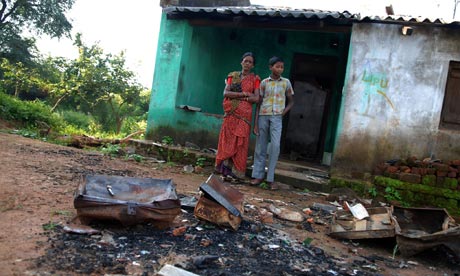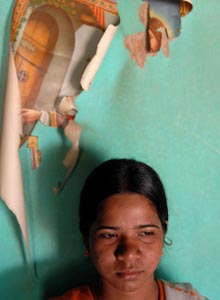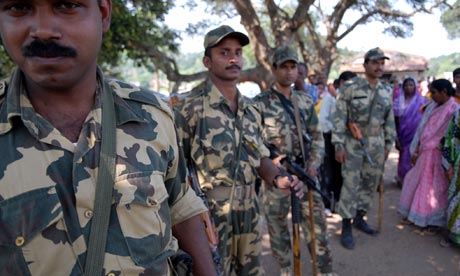
Kumari Naik with her son Santosh amid the ashes of their home. Photograph: Gethin Chamberlain
Hundreds of Christians in the Indian state of Orissa have been forced to renounce their religion and become Hindus after lynch mobs issued them with a stark ultimatum: convert or die.
The wave of forced conversions marks a dramatic escalation in a two-month orgy of sectarian violence which has left at least 59 people dead, 50,000 homeless and thousands of houses and churches burnt to the ground. As neighbour has turned on neighbour, thousands more Christians have sought sanctuary in refugee camps, unable to return to the wreckage of their homes unless they, too, agree to abandon their faith.
Last week, in the worst-affected Kandhamal district, The Observer encountered compelling evidence of the scale of the violence employed in a conversion programme apparently sanctioned by members of one of the most powerful Hindu groups in India, the 6.8-million member Vishwa Hindu Parishad (VHP) - the World Hindu Council.
Standing in the ashes of her neighbour's house in the village of Sarangagada, Jaspina Naik, 32, spoke nervously, glancing towards a group of Hindu men watching her suspiciously. 'My neighbours said, "If you go on being Christians, we will burn your houses and your children in front of you, so make up your minds quickly",' she said. 'I was scared. Christians have no place in this area now.'
On her forehead, she wore a gash of vermilion denoting a married Hindu woman, placed there by the priest at the conversion ceremony she had been obliged to attend a day earlier, along with her husband and three young children. 'I'm totally broken,' she said. 'I have always been a Christian. Inside I am still praying for Jesus to give me peace and to take me out of this situation.'
She and her neighbour, Kumari Naik, 35, gazed forlornly at the charred remains of the house. The mob that arrived one evening in the first week of the violence, armed with swords and axes, had looted what they wanted before dousing the building with petrol and setting it alight. Kumari had fled into the nearby forest with her husband, Umesh, and 14-year-old son Santosh. A smoke-damaged child's drawing of Mickey Mouse pinned to one wall was all that remained of their former lives. Shattered roof tiles crunched underfoot as the women moved through the blackened rooms.
The priest had given them cow dung to eat during the ceremony, they said, telling them it would purify them. 'We were doing that, but we were crying,' Jaspina said.
The roads between the villages are rough and potholed, adding to the difficulties in accessing what is already a remote region, a six-hour drive from the state capital, Bhubaneshwar. The remoteness has undoubtedly played a part in the continuation of the violence, making it harder for police to move about quickly, even if they were minded to do so. Christian leaders, though, have accused the authorities of dragging their feet, claiming they are reluctant to antagonise the majority Hindu community in the run-up to parliamentary elections next year.
 Sumani Naik, 18, stands beneath a torn Christian poster in her fire-damaged house in Kandhamal district after being forced to convert. Photograph: Gethin Chamberlain
Sumani Naik, 18, stands beneath a torn Christian poster in her fire-damaged house in Kandhamal district after being forced to convert. Photograph: Gethin Chamberlain Relations between the Hindu and Christian communities were already at a low ebb when the killing of VHP leader Swami Laxmanananda Saraswati on 23 August provided the trigger for the current wave of violence. The VHP blamed Christians and the mobs descended on the homes of neighbours and friends. Those who were too slow to get away were killed. Amid the savagery, two incidents stood out: a young Hindu woman working in a Christian orphanage was burnt alive and a nun was gang-raped.
Yet the VHP is unrepentant and appears to be involved, at least at grassroots level, with the campaign of forced conversions. One priest who converted 18 Christians in the village of Sankarakhole last week told The Observer that he had been approached by local VHP representatives to carry out the ceremony.
'The VHP people came with letters that said they wanted to be converted, so I converted them,' said Preti Singh Patra, who is the brother of a senior VHP official. Crouching on the ground in front of his temple, set in a small walled garden beneath a huge banyan tree, he ran through the details of the ceremony: first some fruit to eat, followed by a mixture of cow dung and urine mixed with milk and curd, a dip in water from the Ganges, an hour of prayers and then the painting of a bindi on the forehead.
Some local men stepped forward to speak to him. 'Don't say too much,' they warned. The priest seemed unconcerned. The 18 had been the only Christians in the village, he said. They were happy to convert.
Around the village, the countryside is a sea of green, a beautiful lush vista that offers, at a distance, no clues to the turmoil. Yet up close it is a landscape scarred by the ugly remains of homes and churches which lie shattered between other houses still inhabited and unscathed, those belonging to Kandhamal's Hindus.
A few miles down the road from Sankarakhole, in the village of Minia, Sujata Digal, 38, stood outside her own burnt-out home. The mob had arrived at 3am, she said. She and her husband Hari hid in the forest and watched the house burn. When they came out of the forest, the mob returned and told them to convert, and it was not a hard decision.
'They said, 'If you don't become Hindu, we'll burn your houses too and start killing you',' said Ashish Digal, the former Christian pastor. 'I've been forced to convert. Everyone is being converted. They beat us in the fields. I went to the temple. We had to say that we belonged to the Hindu state of Orissa, and that from this day we are Hindus.'

 Soldiers guarding Christian refugees at a camp in Kandamal district. Photograph: Gethin Chamberlain
Soldiers guarding Christian refugees at a camp in Kandamal district. Photograph: Gethin Chamberlain Before the violence started, Christians outnumbered Hindus in Minia: now 115 have converted, roughly half of their original number. The rest have fled.
Burn your Bibles, the men told Ashish Digal. He told them he had, but hid them instead. Every couple of days people come to his house to search, hoping to catch him out. Those people are not strangers; they are his neighbours.
They had been sitting idly in the main road when The Observer's car pulled up. Now the young driver, Sudhir, was rushing down the path that led to what remained of Sujata Digal's house, holding his head, visibly shaken. 'We must leave now,' he said.
He had been standing by the car when the men closed in around him. They left the talking to Prashant Digal, a teacher and organiser for the local VHP youth wing. 'Why did you bring these people here?', he demanded, punching Sudhir in the head. 'Take the vehicle and go. Leave them here for us.' They surrounded him, a young Hindu, and slapped him around again. No one came to his aid. 'If you stay, we will burn you with them in the car. You will all be killed. Just leave them,' they told him. But he did not, which was a decent thing for a frightened boy to do. He drove a little way down the road and parked around a corner, out of sight, and came back to raise the alarm.
Back on the main road, the men were waiting. 'Put your notebook and your cameras away. You will take no pictures and record nothing,' the VHP man said. 'You want to know what is happening? Now I will tell you why this is happening.' He blamed the Christians for taking the jobs of Hindus, for the murder of the Swami. The only solution was for Christians to convert, he said. 'This is a Hindu community. Everyone can stay here, as long as they are part of that community. And now you should go.'
SCOTSMAN NEWS REPORT
Killed or hounded out – just for being Christian
http://news.scotsman.com/world/Killed-or-h...out-.4611121.jp
Published Date: 21 October 2008
By GETHIN CHAMBERLAIN
in Kandhamal district, Orissa
IT WAS about 5:30pm last Monday when Sushil Kumar Naik heard knocking at what remained of his front door.
He peered through the holes left by the axes that the mob had used to batter their way in two weeks earlier. Outside stood a group of his Hindu neighbours, holding guns. The 43-year-old Indian air force officer was not surprised: he had been expecting them.
Like thousands of other Christians, Mr Naik has been living in fear since a wave of violence swept through the Kandhamal district of India's eastern state of Orissa two months ago. At least 59 people have died and thousands of homes and churches have been burned down.
Simmering tensions between the area's Hindu majority and their Christian neighbours were ignited by the murder of a hardline Hindu leader, Swami Laxmanananda Saraswati, on 23 August.
The initial Hindu backlash drove as many as 50,000 Christians from their homes. Now a new threat has emerged, and hundreds have been forced to renounce their faith and convert to Hinduism on threat of death.
The men who called on Mr Naik at his home in the village of Gadaguda last week were not in the mood for small talk.
"You'd better convert," they told him. "If you don't convert to Hinduism, you must leave this place."
They did not say what would happen if he stayed, but Mr Naik did not really need to be told.
The men outside were the same ones who had turned up in the middle of the night two weeks earlier, smashed their way in and set his home on fire. At the time, Mr Naik had been on duty at his air force base more than 1,000 miles away in Nicobar. The only people who were at home were his wife, Binita, 36, and his 70-year-old mother, Brundavati.
"We were sleeping at the time," his mother said, "And then people came from everywhere. We heard them shouting slogans and we ran to the school."
She started to cry, wiping her eyes on her yellow sari. "They were firing guns in the air. They burned most of our possessions. We only got out with the clothes we are standing in."
The slogans the mob had been shouting were those of the Vishwa Hindu Parishad (VHP) – or World Hindu Council – the hardline Hindu organisation that has been blamed for encouraging Hindus to seek revenge for the killing of the swami. The VHP blames Christians for the murder, though Maoist guerrillas have claimed responsibility.
Those slogans were enough to alert Binita and Brundavati to the danger in time. But for their neighbours, Lalia and Mandikini Naik, there was to be no escape. The couple were in their 70s; they were simply too slow to get away.
"The men barged into their house. He couldn't move fast and they cut his throat with an axe," Binita said. "His wife was also cut."
The couple were taken to hospital, where Mr Naik died two days later. His wife remains seriously ill.
Sushil Naik's family were lucky; the police arrived within a few minutes, before the fire could consume the whole house. Even so, most of their possessions have been destroyed.
But they know it is only a matter of time before the men come back, and next time they might not be so lucky.
What makes it harder to bear is that they knew the people who attacked their home. Their family has been in Gadaguda for more than 100 years; the faces of the mob were those of their neighbours, people they had lived alongside and chatted to every day.
"If it was outsiders, they would not have known which house to attack," Mr Naik said.
When police officers eventually started to look for the culprits, some of the Hindu men took to the forests. From there, they appear to be able to venture forth at will to threaten those Christians who have remained in the area.
The Christians do not believe the police really want to help find the men responsible. They point out that smoke from the Hindus' cooking fires rises above the trees every night, but no-one goes after them.
"They were able to come to my house and threaten that we have to convert to Hinduism or stay away," Mr Naik said. "I don't understand what is happening. Even if we become Hindu, what guarantee is there that they will leave us in peace?"
It is a question many of Orissa's Christians are asking: many have concluded that their only option is to convert.
Last week, in the village of Sankarakhole, a little way down the road from Gadaguda, a total of 18 people converted. They were the only four Christian families in the village. Preti Singh Patra, the priest who carried out the ceremony, said the VHP had brought him letters from the families asking to convert. They had been happy to embrace Hinduism, he claimed.
Christians who have converted say nothing could be further from the truth.
In the village of Sarangagada, 32-year-old Jaspina Naik said she and her husband had been forced to take their three children to the temple to convert. "My neighbours said, 'If you go on being Christians, we will burn your houses and your children in front of you, so make up your minds quickly'," she said.
The VHP counters that many of those who are switching to Hinduism are recent converts from Christianity who had been attracted by the economic benefits that went with abandoning their low-caste status as Hindus. The VHP's leaders claim that many of those converts were so repulsed by the killing of the swami that they have been eager to rejoin the fold.
"They saw what happened to the swami – of course they want to come back, what's wrong with that?" said Gouri Prasad Rath, the VHP general secretary in Orissa.
He told The Scotsman the Christians had only themselves to blame for trying to entice Hindus to convert.
"If there is a problem today, I feel it is because the Hindus have lost patience," he said.
"Christians are giving Bibles to uneducated people who have nothing to eat and nothing to wear. They don't even know how to read it," he said. "If you go to their houses, they have a Bible and a photo of Jesus and, by keeping all these things, they think they have turned western.
"But you look at them and they still look like everyone else, and so what's the use of having such a religion when you have the same society as Hindus?"
Few of the 800 people crammed into tents in the Rudangia refugee camp a few hundred yards back along the road from Sushil Naik's home would see it that way.
For them, the idea that they can return to live alongside the people who turned on them so brutally seems little more than fantasy.
Rajma Naik, 45, fled to the camp after a mob chased her out of her home in Gonjugra village. The Hindus had been mocking them for their religion, she said. People were running everywhere, desperate to escape. In front of her, a woman stumbled as she tried to shepherd her eight-year-old son to safety.
"She was killed in front of me," she said. "She was running with her child. She was hit and she fell and they slashed her throat and then they got the child."
There was no way she could live alongside those people again, she said, not as a Christian, not as a Hindu.
"The Hindus say they will kill us," she said.
"In my village, we've been told that if we don't become Hindus, we will be killed. But I will never become a Hindu, even if I have to die."
Publish Post
The full article contains 1319 words and appears in The Scotsman newspaper.
